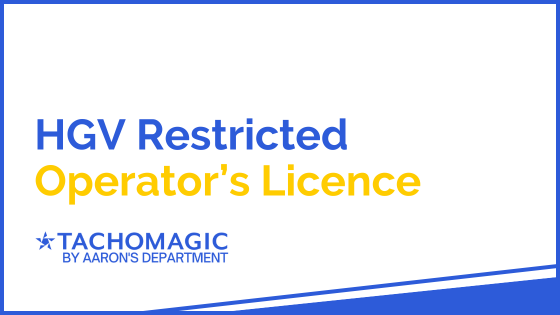Understanding the Restricted Operator's Licence in the UK
Understanding the many vehicle operation rules in the UK can be confusing. This guide will explain the basics of Restricted Operator's Licences to help businesses meet legal requirements more easily.
What is a Restricted Operator's Licence?
The Restricted Operator's Licence, often called a Restricted O Licence or Restricted Ops Licence, is a necessary certification for businesses in the UK that operate vehicles weighing over 3.5 tonnes for transporting their own goods, rather than for hire or reward. This licence is a legal requirement for companies that need to move goods as part of their business operations, but do not operate transport services commercially.
Who Needs a Restricted Operator's Licence?
If your business uses heavy vehicles (over 3.5 tonnes) to move goods as part of its daily operations—such as delivering materials, equipment, or products—then this licence is legally required. However, it's not for businesses involved in commercial transport services or freight.

Key Requirements for Obtaining a Restricted Operator's Licence
To successfully apply for a Restricted Operator's Licence, the businesses must meet several critical requirements:
- Operating Centre: Businesses must have an established operating centre where vehicles are kept when not in use.
- Financial Standing: Applicants must demonstrate that they have the financial resources to maintain their vehicles. For Restricted O Licences, this is currently £3100 for the first vehicle, and a further £1700 for every subsequent vehicle.
- Good Repute: Companies must prove they are well-managed and comply with transport laws. The applicant and their staff will also be assessed for relevant convictions and fixed penalty notices (fines for 'minor' driving offences).
However, a Certificate of Professional Competence (CPC) qualified transport manager is not required for a business to hold a Restricted Operator's Licence.
For more guidance on the Traffic Commissioners' Good Repute requirements, click here to open a PDF of their guidance document.
Detailed Rules and Regulations
Operating under a Restricted Operator's Licence involves adhering to specific rules, collectively known as Restricted O Licence Rules. These rules are designed to ensure that vehicles are maintained properly, safety standards are met, and that all operations are conducted within the bounds of the law. It's essential for licence holders to regularly review and comply with these regulations to avoid penalties.

Comparison with Other Licences
Understanding the differences between the Restricted Operator's Licence and other types of operator licences is vital for businesses. There are three types of HGV O Licence:
Standard National licence
This level of O Licence allows you to carry goods (whether they are your own, or others') anywhere in the UK.
Standard International Licence
With this Operator's Licence, you are permitted to carry goods both in the UK, and on international journeys. However, to drive in the EU, a UK Licence for the Community is also required.
Restricted Licence
Restricted Licences allow operators to carry their own goods, but not for hire or reward.
For example, a scaffolder could use a Restricted Operator's Licence since their vehicles would be used to transport their own equipment, which they need to provide their service. However, a skip hire business would not be able to do this, as delivering the skip to and from the customer's address (the main function of the business) would constitute haulage for hire or reward. This example was tested in a recent high-profile ruling.
How To Apply For A Restricted Operators Licence
If you’re applying for a Restricted Operator’s Licence, you can do so online via the GOV.UK website or by post. The decision process typically takes up to 7 weeks for online applications and up to 9 weeks for postal applications. You can start your application here: Apply for a Vehicle Operator Licence.
Key Requirements for Your Application
When applying for a Restricted Operator’s Licence, you’ll need to meet several conditions, including:
- Paying the required fee.
- Advertising your application and the details of your proposed operating centre(s), where vehicles will be stored when not in use.
- Providing financial information to demonstrate your ability to maintain your fleet.
- Arranging maintenance: If you don’t handle vehicle safety inspections and repairs yourself, you must have a maintenance contract with a garage or agent.
- Designating a transport manager (only for standard licences).
Need Your Licence Quickly?
If you’re in urgent need, you can apply for an interim licence to operate while your full licence application is being processed. However, interim licences are only considered once the Traffic Commissioner has received a complete application for an operator’s licence.
Ensure you’re fully prepared to meet the requirements and streamline the process by gathering all necessary information and documentation in advance.
Maintaining Compliance
Once obtained, maintaining a Restricted Operator's Licence requires ongoing compliance with restricted operator's licence rules, vehicle inspections, and adherence to safety protocols. Businesses may find it beneficial to appoint a transport manager to oversee compliance, although this isn't a requirement.
Holders must pay a licence continuation fee every 5 years in order to keep their licence valid. This currently costs £401.
Summary
A Restricted Operator's Licence is essential for businesses in the UK that transport their own goods using large vehicles. Compliance with restricted operator's licence requirements ensures safe and legal operation of transport activities. Businesses must stay informed about the latest regulations and ensure all aspects of their operations align with the Traffic Commissioner’s standards.
For further information, refer to the UK Government's official guide on goods vehicle operator licensing.

Further Reading
If you've found our page useful, we've linked below a few more of our recent helpful FAQ guides:
About The Author

Simon Theaker
Simon has over 20 years of dealing with tachograph analysis, and the technologies involved.
His in-depth knowledge and hands-on experience have made him a key behind-the-scenes member of the TachoMagic team.
Through his blogs, Simon hopes to make the lives of Fleet Managers easier, as he shares the answers to some of the most common questions he has received.

